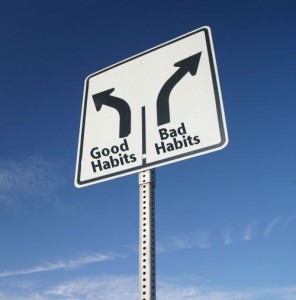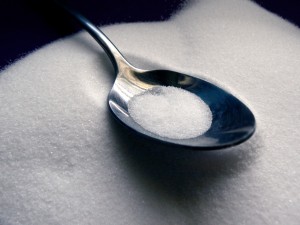Sugar – are you addicted?
 With more and more people being diagnosed with diabetes, heart problems, high blood pressure, high cholesterol and obesity it makes you question whether the popular policy of ‘Low-Fat’ dieting is really working?
With more and more people being diagnosed with diabetes, heart problems, high blood pressure, high cholesterol and obesity it makes you question whether the popular policy of ‘Low-Fat’ dieting is really working?
In the opinion of some, myself included, the real problem in our diet is sugar. Hidden under terms such as glucose, sucrose, malt syrup, dextrose, and corn syrup in most of the everyday foods we put into our supermarket shopping trollies, it’s no wonder we’re addicted without even realizing it.
The problem with sugar is that when we consume it, our bodies release insulin, this insulin gives us energy to get things done. However, with the sedentary lives we live today, we’re often not moving for the majority of our day. This means our bodies then store this released insulin as fat. (Eat enough sugar and release enough insulin over time, eventually your body can’t cope with it and you develop diabetes). In the meantime our energy dips with the accompanying sugar low and our craving for more sugar to have more energy rises again and so the cycle continues.
The other major problem with sugar is that when we eat it, thanks to our hormones, our appetite is never satisfied with it alone and no matter how many donuts we eat, we’re not going to feel ‘full’. And so the cycle continues yet again. It’s a toxic habit and studies have found the chemistry in the brain of a sugar addict is similar to that of a drug addict.
Are you a sugar addict? Find out..
 1. Is the prospect of going one whole day without sugar daunting to you?
1. Is the prospect of going one whole day without sugar daunting to you?
2. Are you overweight with a high body fat percentage?
3. Are you constantly hungry yet eat quite a lot and lead a rather sedentary lifestyle?
4. Are you always craving sugary, sweet foods?
5. Do you suffer with poor concentration?
6. Are you irritable? Moody? Depressed?
7. Do you suffer from headaches?
8. Do you wake up tired, needing tea/coffee or something sweet to get you going in the mornings?
9. Is your energy lower now than it used to be?
10. Do you suffer with fatigue? Often too tired to exercise and falling asleep in the early evening?
If you answer ‘yes’ to more than 5 questions you’re highly likely to be addicted to sugar.
The good news is that beating this addiction is possible. The bad news is that you will more than likely suffer from withdrawal symptoms. However, if you stick with it, you will find your energy increases and will be more constant, you won’t suffer with those 3pm sugar blues (honestly!), you’ll sleep better, look better, feel better and the bonus – you’ll probably lose weight too and spend a lot less on vending machines!
To help you along, here’s my tips on things you can do to make your journey to health a little easier:
– Try adding a good B Complex to your day; this will help improve your energy and also boost your mood.
– White bread: SWAP IT FOR wholegrain rye or a low GI bread such a Burgen.
– Chromium Picolinate 1000mcg a day has been proven to help with sugar withdrawal.
– Sugary breakfast cereals: SWAP IT FOR porridge or unsweetened muesli.
– Cinnamon, a teaspoon a day added to cereals, yogurts, smoothies helps maintain even blood sugar levels which help with cravings.
– Cereal bars: SWAP IT FOR 2 oatcakes with no-added-sugar peanut butter.
– Decrease your salt intake as it makes you crave sugar.
– Stir fry sauces: SWAP IT FOR homemade sauces with ginger, garlic and olive oil.
 – Say no to desserts and instead have baked fruit or try frozen grapes for something sweet after meals.
– Say no to desserts and instead have baked fruit or try frozen grapes for something sweet after meals.
– Fizzy drinks, diet and zero sugar included: SWAP IT for soda water and a slice of lime.
LISA’S TIP:
A new habit can take up to 6 weeks to become a part of your daily life, commit to at least 1 month without sugar and reward yourself after 2 weeks with something non-sugar related to keep you motivated or enlist a friend to go cold turkey with you to keep you accountable.
Short URL: https://newrytimes.com/?p=11864














Dear Sirs,
You have hit upon perhaps the most critical issue current in nutrition and eating habits in the modern world. However, your report is misleading. It is not all sugar which is bad, nor is insulin laid down as fat. In fact, our livers have an infinite capacity to deal with glucose, which is the sugar we are designed to eat, and every cell in the body is able to metabolise it safely. The problem is with fructose, a sugar that we have a very limited capacity to cope with. Only cells in the liver can metabolise this sugar, and if eaten in even moderate quantities, produces toxins similar to those produced in the breakdown of ethanol, that is, alcohol. Soft drinks and even modern breads are laced with fructose, and the body cannot cope with these.
Further, when we eat glucose, the body becomes satiated because of glucoses inte-relationship with insulin, and the feedback system that informs the brain that we have had enough to eat. With fructose there is no such feedback system so, we can eat fructose and continue to feel hungry and, that is why it is so dangerous; we continue to eat it not realising the harm that it is doing.
Nowadays, fructose is practically everywhere in your fast food or in your soft drink particularly. Indeed, the fast food that you eat turns brown not because it is cooked, but because of the caramelisation of the sugars inside.
Sucrose however, is a complex sugar consisting of one half fructose and one half glucose. So, it too has health concerns. However, since it is eaten with glucose, one is more likely to be satiated.
The prevalence of fructose in the diet, is perhaps the most important factor in the epidemic of diabetes, obesity and chronic heart disease that we currently face. If you are drinking soft drinks and fast food, even moderate quantities, you are in fact poisoning yourself in the same way as long-term abuse of alcohol. In terms of damaging toxins, one can of soft drink is roughly equivalent to one can of beer. Fructose is of course the precursor to the formation of alcohol in the fermentation process, hence the similarity in their destructive effect on the human body. Of course, fructose is a naturally occurring sugar, but it is usually ingested with a good deal of roughage, in order to protect us from over-eating it. It is no coincidence, for example, that sugar cane is almost entirely inedible roughage; it is nature’s way of protecting us. It has been shown from research, that the plantation workers, harvesting the cane sugar, lived longer than the plantation owners who ate the refined sugar. This is no coincidence.
This is a subject that deserves greater attention. Thank you for bringing it to the attention of everybody.
Yours faithfully,